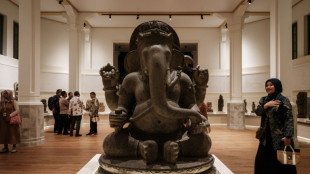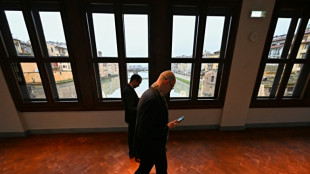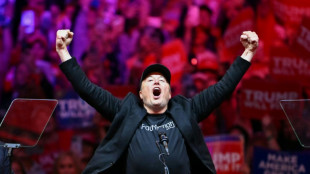
-
 Ski great Vonn finishes 14th on World Cup return
Ski great Vonn finishes 14th on World Cup return
-
Scholz visits site of deadly Christmas market attack

-
 Heavyweight foes Usyk, Fury set for titanic rematch
Heavyweight foes Usyk, Fury set for titanic rematch
-
Drone attack hits Russian city 1,000km from Ukraine frontier

-
 Former England winger Eastham dies aged 88
Former England winger Eastham dies aged 88
-
Pakistan Taliban claim raid killing 16 soldiers

-
 Pakistan military courts convict 25 of pro-Khan unrest
Pakistan military courts convict 25 of pro-Khan unrest
-
US Congress passes bill to avert shutdown

-
 Sierra Leone student tackles toxic air pollution
Sierra Leone student tackles toxic air pollution
-
German leader to visit site of deadly Christmas market attack

-
 16 injured after Israel hit by Yemen-launched 'projectile'
16 injured after Israel hit by Yemen-launched 'projectile'
-
Google counters bid by US to force sale of Chrome

-
 Russia says Kursk strike kills 5 after Moscow claims deadly Kyiv attack
Russia says Kursk strike kills 5 after Moscow claims deadly Kyiv attack
-
Cavaliers cruise past Bucks, Embiid shines in Sixers win

-
 US President Biden authorizes $571 million in military aid to Taiwan
US President Biden authorizes $571 million in military aid to Taiwan
-
Arahmaiani: the Indonesian artist with a thousand lives

-
 Indonesians embrace return of plundered treasure from the Dutch
Indonesians embrace return of plundered treasure from the Dutch
-
Qualcomm scores key win in licensing dispute with Arm

-
 Scientists observe 'negative time' in quantum experiments
Scientists observe 'negative time' in quantum experiments
-
US approves first drug treatment for sleep apnea

-
 US drops bounty for Syria's new leader after Damascus meeting
US drops bounty for Syria's new leader after Damascus meeting
-
Saudi man arrested after deadly car attack on German Christmas market

-
 'Torn from my side': horror of German Christmas market attack
'Torn from my side': horror of German Christmas market attack
-
Bayern Munich rout Leipzig on sombre night in Germany

-
 Tiger in family golf event but has 'long way' before PGA return
Tiger in family golf event but has 'long way' before PGA return
-
Pogba wants to 'turn page' after brother sentenced in extortion case

-
 Court rules against El Salvador in controversial abortion case
Court rules against El Salvador in controversial abortion case
-
French court hands down heavy sentences in teacher beheading trial

-
 Israel army says troops shot Syrian protester in leg
Israel army says troops shot Syrian protester in leg
-
Tien sets-up all-American NextGen semi-final duel

-
 Bulked-up Fury promises 'war' in Usyk rematch
Bulked-up Fury promises 'war' in Usyk rematch
-
Major reshuffle as Trudeau faces party pressure, Trump taunts

-
 Reggaeton star Daddy Yankee in court, says wife embezzled $100 mn
Reggaeton star Daddy Yankee in court, says wife embezzled $100 mn
-
Injured Eze out of Palace's clash with Arsenal

-
 Norway's Deila named coach of MLS Atlanta United
Norway's Deila named coach of MLS Atlanta United
-
Inter-American Court rules Colombia drilling violated native rights

-
 Amazon expects no disruptions as US strike goes into 2nd day
Amazon expects no disruptions as US strike goes into 2nd day
-
Man Utd 'more in control' under Amorim says Iraola

-
 Emery insists Guardiola 'still the best' despite Man City slump
Emery insists Guardiola 'still the best' despite Man City slump
-
US confirms billions in chips funds to Samsung, Texas Instruments

-
 English Rugby Football Union chairman quits amid pay row
English Rugby Football Union chairman quits amid pay row
-
Major reshuffle as Trudeau faces party pressure, Trump attacks

-
 Gatland remains as Wales boss but must 'change fortunes on the pitch'
Gatland remains as Wales boss but must 'change fortunes on the pitch'
-
Argentina's dollar craze cools under greenback-loving Milei

-
 Medici secret passageway in Florence reopens after refit
Medici secret passageway in Florence reopens after refit
-
Anger after Musk backs German far right

-
 Arteta says 'best is yet to come' as he marks five years at Arsenal
Arteta says 'best is yet to come' as he marks five years at Arsenal
-
Pereira happy to achieve Premier League 'target' with Wolves

-
 'Dark lull' in German energy transition sparks political debate
'Dark lull' in German energy transition sparks political debate
-
Russian skaters allowed to compete as neutrals in 2026 Winter Olympics


Tariffs, tax cuts, energy: What is in Trump's economic plan?
Republican presidential candidate Donald Trump wants to bring back US manufacturing and lower costs, relying on tariffs to boost US coffers and exert pressure on other countries -- but the reality is less straightforward.
Ahead of November's election, economists warn his policies could raise consumer prices and shake up global trade -- with unclear benefits to US production.
The pitch is for tariffs to add billions in revenue and take aim at countries like China which have been "ripping us off," while pushing businesses to bring production back on US shores.
"Other countries are going to finally, after 75 years, pay us back for all that we've done for the world," Trump said in his September debate with Democratic nominee Kamala Harris.
He told a rally in Michigan last week: "Tariffs, to me, are the most beautiful word."
The former president has vowed a 10 percent to 20 percent across-the-board tariff on imports and a 60 percent rate on Chinese goods -- more recently threatening a 200 percent levy on automobiles made in Mexico.
It is US businesses -- not foreign governments, as Trump often asserts -- that pay import taxes on overseas purchases when there are tariffs on such goods, and they can pass on the higher costs, which could add to inflation.
Alongside his tariff plans, Trump wants to extend expiring tax cuts and lower corporate income tax further.
But proposed tariffs could counteract the benefits from his tax policy "while falling short of offsetting the tax revenue losses," said the Tax Foundation think tank.
- Higher costs -
US inflation could rise 1.3 percentage points above baseline next year if Trump imposed a 10 percent universal tariff and other governments retaliate, said the Peterson Institute for International Economics (PIIE).
Sharp hikes on Chinese goods would also fuel inflation, the institute added.
Others, like Bernard Yaros of Oxford Economics, estimates a Trump presidency could raise inflation by 0.6 percentage points at its peak.
Previously, businesses bore the brunt as imported components got more expensive, said Kyle Handley, professor at UC San Diego.
But he noted: "If they do an across-the-board tariff of 10 percent to 20 percent, there's no way we're not going to see that on store shelves."
And it is unlikely that manufacturing can return to the United States in short order.
"We haven't made TVs in the US in decades," Handley said, adding that US factories are not producing at the scale needed to satisfy consumption either.
Trump claims earlier tariff hikes on China and others brought no inflation.
But Handley estimates the supply chain frictions exporters faced were equivalent to a two to four percent tariff hit -- and companies tell AFP they have had to pass on some costs.
A 2019 paper in the Journal of Economic Perspectives found that by end-2018, import tariffs were costing US consumers and importers an additional $3.2 billion per month in added tax costs.
- Rerouting trade -
Trump's tariff plans could also slash bilateral US-China trade by 70 percent, redirecting or eliminating hundreds of billions of dollars' worth of exchanges, said Oxford Economics.
US trade volumes could be cut by 10 percent, becoming more centered on North American and other free trade agreement partners, the advisory firm added.
While the added tariffs would raise some $500 billion in revenue annually, rerouted trade from China could slash this figure closer to $200 billion per year eventually, Yaros said.
Other proposals like revoking a status that shields China from various US levies -- "permanent normal trade relations" -- could also raise inflation by 0.4 percentage points in 2025, PIIE added.
Although Trump wants a "reciprocal trade act" where "countries that make us pay a tax to do business with them will be charged the same tax when they send their product into the United States," Yaros believes this is less likely as it requires bipartisan Congressional support.
- Food, energy -
Trump regularly promises to eliminate inflation, too -- a critical voter concern -- saying he would slash energy bills in half within a year.
Analysts expect that this refers to more deregulation in the domestic oil and gas sector.
But Yaros expressed skepticism that this would "unleash significantly greater production" given that it depends on major energy producers, who in turn have shareholders to answer to.
While Trump wants to lower food costs by allowing less foreign agricultural products into the country, economists have noted that import barriers could trigger retaliation.
This could harm US farmers who export significantly.
M.Carneiro--PC
